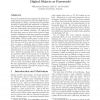Free Online Productivity Tools
i2Speak
i2Symbol
i2OCR
iTex2Img
iWeb2Print
iWeb2Shot
i2Type
iPdf2Split
iPdf2Merge
i2Bopomofo
i2Arabic
i2Style
i2Image
i2PDF
iLatex2Rtf
Sci2ools
111
click to vote
USS
2008
2008
Digital Objects as Passwords
Security proponents heavily emphasize the importance of choosing a strong password (one with high entropy). Unfortunately, by design, most humans are apparently incapable of generating such passwords, or memorizing a random-looking, machine-generated one for longterm use. Infrequently used passwords pose even bigger security and usability problems. We exploit the fact that many users now own or have access to a large quantity of digitized personal or personally meaningful content in designing an object-based password scheme called ObPwd. ObPwd enables users to select a password generating object from their local collection or from the web, and then converts the password object (e.g. an image, a particular piece of music, excerpt from a book) to a (potentially) high-entropy text password that can be used for regular or secondary web authentication, or in local applications (e.g. encryption). Instead of requiring users to memorize an exact password, ObPwd only requires one to remember a...
Related Content
| Added | 02 Oct 2010 |
| Updated | 02 Oct 2010 |
| Type | Conference |
| Year | 2008 |
| Where | USS |
| Authors | Mohammad Mannan, Paul C. van Oorschot |
Comments (0)

